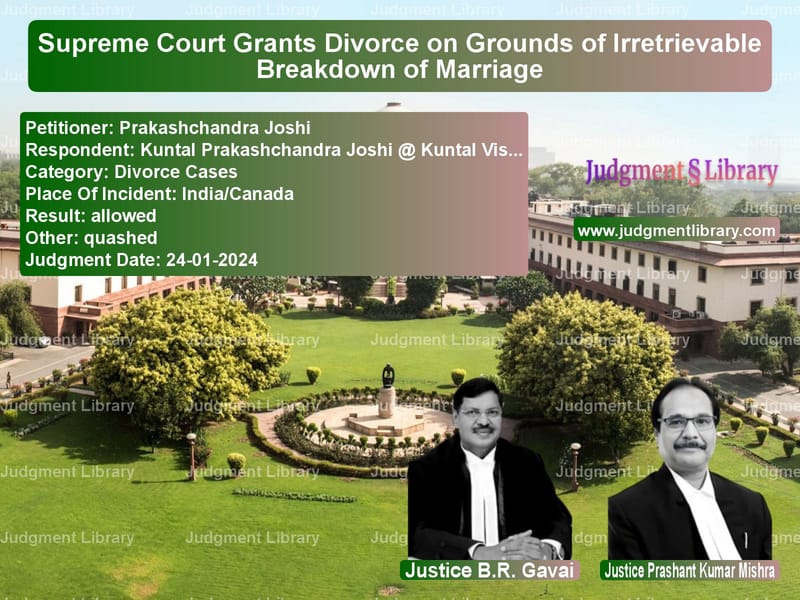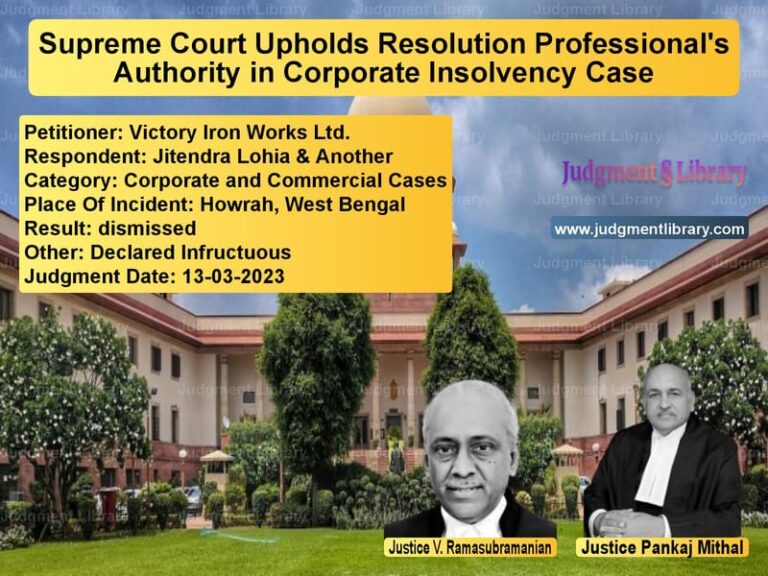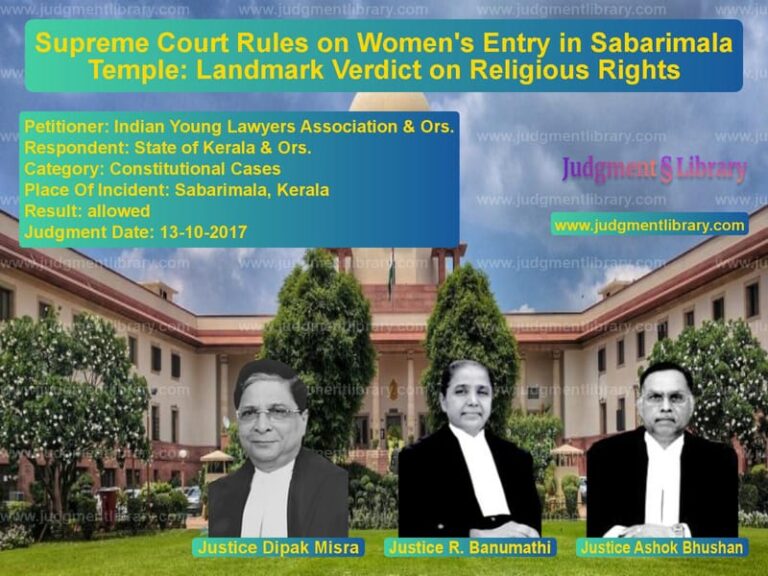Supreme Court Grants Divorce on Grounds of Irretrievable Breakdown of Marriage
The Supreme Court of India, in its judgment dated January 24, 2024, dissolved the marriage between Prakashchandra Joshi and Kuntal Prakashchandra Joshi, citing the irretrievable breakdown of their relationship. The decision was made under Article 142(1) of the Constitution of India, allowing the Court to do ‘complete justice’ in cases where reconciliation is impossible.
Background of the Case
The marriage between the appellant and respondent was solemnized on January 5, 2004, after an eight-year-long courtship. Both parties were Indian citizens by birth but later acquired Canadian citizenship. They had been leading a normal married life in Canada until the appellant started experiencing severe health issues, including back pain and allergies. Due to these health concerns and the recession in Canada, the couple returned to India in January 2011.
However, within a month of their return, the respondent moved to her parental home and later left for Canada with their son. Despite multiple attempts by the appellant to reconcile and resume cohabitation, the respondent neither responded nor returned to live with him.
Feeling abandoned, the appellant initially filed a petition under Section 9 of the Hindu Marriage Act for restitution of conjugal rights. Since the respondent failed to appear, the appellant withdrew the petition and subsequently filed for divorce on the grounds of cruelty and desertion.
Key Legal Issues
- Whether the refusal of the respondent to cohabit with the appellant constituted cruelty and desertion.
- Whether the absence of reconciliation efforts for over a decade justified granting a divorce.
- Whether the Supreme Court could exercise its power under Article 142(1) to dissolve the marriage on the grounds of irretrievable breakdown.
Petitioner’s Arguments
The appellant argued that his wife deserted him in 2011 and refused all efforts at reconciliation. Despite multiple attempts to contact her through emails and other means, she neither responded nor showed any willingness to resume their matrimonial relationship. The appellant further contended that the respondent’s complete disregard for the marriage and her absence from legal proceedings demonstrated that the relationship had broken down beyond repair.
The appellant’s counsel relied on previous judgments, particularly Sukhendu Das v. Rita Mukherjee (2017) 9 SCC 632 and Samar Ghosh v. Jaya Ghosh (2007) 4 SCC 511, which established that prolonged separation with no possibility of reconciliation constitutes mental cruelty and a ground for divorce.
Respondent’s Arguments
The respondent failed to appear in the proceedings at all levels, including before the Family Court, High Court, and the Supreme Court. Her complete lack of participation in the case further reinforced the appellant’s claim that she had abandoned the marriage.
Supreme Court’s Observations
The Court noted that:
“The respondent deserted the appellant about 13 years ago and refused to cohabit with him. There have been no contacts between them during this period, and she has failed to respond to legal summons, clearly indicating that she is no longer interested in continuing the marriage.”
The Court further observed:
“In proceedings initiated by the appellant for restitution of conjugal rights, the respondent did not appear despite receiving the summons. In the present divorce proceedings as well, she failed to enter an appearance. This clearly indicates that the respondent has no interest in maintaining the marital relationship.”
Referring to the landmark judgment in Shilpa Sailesh v. Varun Sreenivasan (2023 SCC Online SC 544), the Court emphasized that it has the power to dissolve a marriage under Article 142(1) when it is convinced that the relationship has completely broken down with no possibility of revival.
The judgment in Shilpa Sailesh highlighted:
“Grant of divorce on the ground of irretrievable breakdown of marriage by this Court is not a matter of right, but a discretion which is to be exercised with great care and caution. The marriage must be factually determined to be totally unworkable, emotionally dead, and beyond salvation.”
The Court also cited various factors to consider when determining whether a marriage has irretrievably broken down, including:
- The period of time the parties have been separated.
- The nature of allegations made by each party.
- The impact of prior legal proceedings on their relationship.
- Whether any attempts at reconciliation were made.
- The economic and social status of both parties, including their children.
Since the appellant and respondent had been living separately for over 13 years with no communication and no effort at reconciliation, the Court found that the marriage had indeed irretrievably broken down.
Final Judgment
The Supreme Court allowed the appeal and dissolved the marriage under Article 142(1) of the Constitution, stating:
“We have no hesitation in holding that this is a case of irretrievable breakdown of marriage, as there is no possibility of the couple staying together.”
The marriage between the parties, solemnized on January 5, 2004, was thus dissolved by a decree of divorce.
Key Takeaways from the Judgment
- Prolonged separation without efforts at reconciliation can justify granting a divorce.
- The Supreme Court can exercise its discretionary power under Article 142(1) to dissolve a marriage that has irretrievably broken down.
- Non-appearance in legal proceedings by one party can indicate a lack of interest in maintaining the marriage.
- The welfare of children and other economic considerations must be factored into such decisions.
This judgment reinforces the evolving jurisprudence on divorce, recognizing that when a marriage is beyond repair, it is in the best interest of both parties to grant dissolution rather than prolong an unsustainable legal bond.
Petitioner Name: Prakashchandra Joshi.Respondent Name: Kuntal Prakashchandra Joshi @ Kuntal Visanji Shah.Judgment By: Justice B.R. Gavai, Justice Prashant Kumar Mishra.Place Of Incident: India/Canada.Judgment Date: 24-01-2024.
Don’t miss out on the full details! Download the complete judgment in PDF format below and gain valuable insights instantly!
Download Judgment: prakashchandra-joshi-vs-kuntal-prakashchandr-supreme-court-of-india-judgment-dated-24-01-2024.pdf
Directly Download Judgment: Directly download this Judgment
See all petitions in Mutual Consent Divorce
See all petitions in Alimony and Maintenance
See all petitions in Judgment by B R Gavai
See all petitions in Judgment by Prashant Kumar Mishra
See all petitions in allowed
See all petitions in Quashed
See all petitions in supreme court of India judgments January 2024
See all petitions in 2024 judgments
See all posts in Divorce Cases Category
See all allowed petitions in Divorce Cases Category
See all Dismissed petitions in Divorce Cases Category
See all partially allowed petitions in Divorce Cases Category







